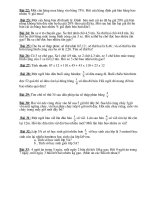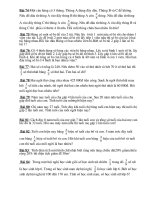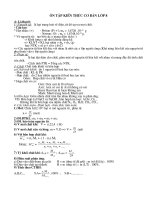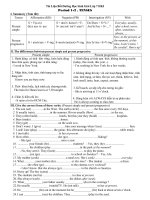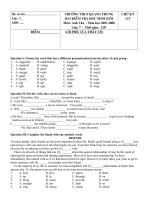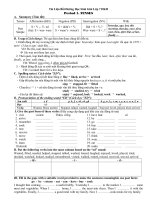TL BOI DUONG HSG LOP 7 HKII.doc
Bạn đang xem bản rút gọn của tài liệu. Xem và tải ngay bản đầy đủ của tài liệu tại đây (1.1 MB, 20 trang )
Tài Liệu Bồi Dưỡng Học Sinh Giỏi Lớp 7 HKII
Period 1. TENSES
A. Summary (Tóm tắt):
Tenses Affirmation (KĐ) Negation (PĐ) Interrogation (NV) With
Past
Simple
S + V
2
- V- ed
(be): S + was- were
S + didn’t + V
1
S + wasn’t - weren’t
Did + S + V
1
?
Was- were + S +..?
Yesterday, ago, last, this
morning, that day, once, first,
next, then, after that, at last,
finally …
B. Usage (Cách dùng): Thì quá khứ đơn được dùng để diễn tả:
1. Hành động đã xảy ra trong QK xác định rõ thời gian: Yesterday: hôm qua/ Last night: tối qua/ In 1979 <
now/ (3 days) ago: cách đây……
VD: He (be, not) there last year.
He was not there last year.
2. Thói quen, loạt hành động kế tiếp nhau trong quá khứ: First: lúc đầu, later, then, after that: sau đó,
finally, at last: cuối cùng....
VD: When I was a boy, I often played football.
3. - Hành động đã xảy ra suốt một khoảng thời gian trong QK:
VD: I worked there for a few days.
C. Spelling notes ( Cách thêm ”ED”):
- Thêm d nếu động từ kết thúc bằng e: like
→
liked, arrive
→
arrived
- Gấp đôi phụ âm nếu động từ một vần kết thúc bằng nguyên âm (u,e o, a, i) và một phụ âm:
stop
→
stopped, fit
→
fitted
- Chuyển y
→
i + ed nếu động từ một vần kết thúc bằng một phụ âm +y:
study
→
studied, try
→
tried
- Còn lại thì thêm ed: enjoy
→
enjoyed, look
→
looked, work
→
worked,
D. Pronunciation of the ending sound “ED” (Cách đ ọc ”ED”):
Âm cuối t, d p, k, f, s, sh, ch, gh b ,g ,n ,l z, v ,m, r, y, u, e, o, a, I, w
Đọc -id- -t- -d-
Ví dụ Wanted, fitted, needed Stopped, talked, washed, laughed Enjoyed, loved, played, tried, arrived
I. Give the past form of these verbs: (Hãy cung cấp dạng quá khứ của các động từ sau)
1. visit visited Thăm, viếng 11. have had có
2. arrive ……………… ……………… 12. be ……………… ………………
3. remember ……………… ……………… 13. go ……………… ………………
4. cook ……………… ……………… 14. buy ……………… ………………
5. rent ……………… ……………… 15. take ……………… ………………
6. receive ……………… ……………… 16. see ……………… ………………
7. move ……………… ……………… 17. think……………… ………………
8. watch ……………… ……………… 18. wear……………… ………………
9. learn ……………… ……………… 19. eat ……………… ………………
10.decide ……………… ……………… 20. make ……………… ………………
II. Put the following verbs into the same column based on the “ed” sound:
Wanted, fitted, needed, helped, stopped, talked, washed, leaned, laughed, enjoyed, loved, played, tried, decided,
watched, looked, studied, remembered, visited, walked, rented, missed, received, moved, arrived
- id - - t - - d -
III. Fill in the gaps with a suitable word provided to make the sentences meaningful, use past form:
go - be - return - cut - can - have - buy - cook
I thought that cooking…………… a useful hobby. Yesterday I ………… to the market. I ………… some
meat and vegetables. When I ……… home, I ……… the meat into slices. Then I ………… it with the
vegetables. Finally, I …………… a good meal with my family. Now I ………….cook meals for my family.
Period 2. TENSES FOR FUTURE ACTIONS
I. Summary (Tóm tắt):
Tenses Usages Examples
With
Present
simple
Thời khoá biểu, lịch trình, chương
trình TV, thể thao, máy bay, tàu, xe:
Trong mệnh đề IF và WHEN (chỉ TL)
The train leaves at five o’clock tomorrow.
He will give her your letter when he sees
her tomorrow.
If you don’t come early, we’ll be late.
Tomorrow,
tonight,
soon,
next,
someday,
in the
future
Present
Progressive
Kế hoạch, sự sắp xếp cho tương lai
gần cho các cuộc hẹn gặp, du lịch,
hội họp đi kèm với go / come /
leave/ arrive/ have/ meet
I’m going to Dalat next week.
I am m eeting Peter tonight. He’s taking me to
the theater.
We are having a party for our son next week.
Intended
Future
Ý định đã được dự trù trước khi nói
hoặc sự suy đoán chắc chắn dựa vào
căn cứ hiện tại:
I am going to visit New York this summer.
There are a lot of clouds. I think it is going
to rain.
Future
Simple
Ý định ngay khi nói. Ý kiến, lời hứa,
hy vọng, phát biểu, tiên đoán chủ
quan về một hành động trong tương
lai:
I will give your book back next week.
I hope you will be lucky.
I think he will pass the next exam.
II. Give the correct form of these verbs:
1. There (be) …………………………. a good film on TV tonight.
2. Miss Helen (help) ……………………… you if she (finish) …………………… that letter tomorrow.
3. I (see) …………… my parents at the airport this afternoon. They (arrive) ……………… at 4 PM.
4. Wait here and I (come) ……………………… back right now.
5. When you (go) …………………… into the office, Mr. John (is) ………………… at the front desk.
6. We (save) …………………… money because we (buy) …………………… a new house next year.
7. Where …………………… you spend your holidays? I (go) …………………… to Spanish.
8. Our flight (leave) …………………… for Ho Chi Minh City at five tomorrow.
9. Mai is learning English. She (travel) …………………… to England next month.
10. Come to the library before seven tomorrow. It (open) …………………… at seven am.
11. The boys (start) …………………… school on Monday.
III. Give the correct form of these verbs:
1. He (move) ……………………. to Paris in 1917. And now he (live) ……………………. in London.
2. My mother (go) ……...... to the supermarket yesterday evening, but she (not, buy) …..……….anything.
3. My family (watch) ……………. TV every night. But now we (listen) …………………. to Pop musiC.
4. What…………………. you (do) …………………. at recess tomorrow? -Perhaps, I (borrow)
………………. an English book in the library.
5. I think she (win) ………………. the gold medal.
6. Mozart (play)……………… the piano when he (be) ………………. three.
7. Everyday Nam (go) …………. to school at six. He usually (play) …………. soccer after school.
8. Ba (be) ………….. in the room. He (make) …………. so noisy. He (rehearse) ….........………. a play.
9. Next week Doan (have) ……………. a birthday party. He (be) ……………. 14 years olD.
10. When my brother (be) ……………. a child, he (have) ……………. two cats and a dog.
11. Trang (not write) ……………. to her parents last week; she (phone) ……………. her.
12. How much ……………. it (cost) ……………. to mail a letter to London?
13. …………..…You (go) ……………. last night? - Yes, I (go) ……………. to the movies.
14. Lien’s brother is an architect, but he (not work) ……...........………. at the moment.
15. When ……………. you(buy) ……………. this picture? I (buy) ……………. it along time ago.
16. Look! He (look) ……………............ for something at present.
17. What ……………. you (do) ……………. Tan? - I (write) ……………. a letter.
18. How often …………. you (write) …………. letters? I (write) ……………. them every week.
19. We (not see) ……………. him last year. He (leave) ……………. for Ho Chi Minh.
20. I (see) …………...…. a movie tonight. ……………. you (go) ……………. with me?
Period 3. ADVERB CLAUSES OF RESULT AND CONCESSION
A. ADVERB CLAUSES OF RESULTS:Là mệnh đề trạng ngữ chỉ kết quả bắt đầu các liên từ:so ... that;
such ... that (quá ... đến nỗi) Chỉ một nguyên nhân dẫn đến một kết quả.
S +V+ SO + ADJ/ ADV THAT + S + (can/ could/will/ would/ may/ might) + V
1
He is so sleepy that he cannot watch T.V.(Cậu ấy quá buồn ngũ đến nỗi Cậu ấy không thể xem T.V.)
S +V+ SO + Many + Plural N + THAT + S + (can/ could/will/ would/ may/ might) + V
Few
He has so many books that he can’t read them all.(Cậu ấy có nhiều sách đến nỗi Cậu ấy không thể đọc hết.)
There are so few players that they can’t form a football team.(Có quá ít cầu thủ đến nỗi khôg thể lập đội bóng được.)
S +V+ SO + Much + Singular N + THAT + S + (can/ could/will/ would/ may/ might) + V
Little
The grass got so much water that it turns yellow.(Cỏ bị úng nhiều nước đến nỗi nó chuyển sang màu vàng.)
He has so little money that he cannot buy a ticket.(Cậu ấy có ít tiền đến nỗi Cậu ấy không thể mua 1 vé.)
S +V+ Such+ (a/an) + ADJ+ N + THAT + S + (can/ could/will/ would/ may/ might) + V
1
It was such a hot day that we had to take baths many times.(Đó là ngày nóng tới mức tôi phải tắm nhiều lần)
S +V+ SO + ADJ + a/an + Singular N + THAT + S + (can/ could/will/ would/ may/ might) + V
It was so hot a day that we decided to stay at home. (Đó là ngày nóng tới mức ch úng tôi phải quyết định ở nhà)
B. ADVERB CLAUSES OF CONCESSION: Là mệnh đề trạng ngữ chỉ sự nhượng bộ bắt đầu các liên từ:
though, even though, although (mặc dù) chỉ sự tương phản hay sự trái ngược giữa hai mệnh đề
S +V+ THOUGH / EVEN THOUGH / ALTHOUGH + S + V
Although it was very bad, we had a picniC. (Dù thời tiết rất xẩu, chúng tôi vẫn đi dã ngoại.)
C. Join two sentences into one using “so ... that”:
1. The lesson is very difficult. nobody can understand it.
...................................................................................................................................................
2. I have many letters. I can’t read them in an hour.
...................................................................................................................................................
3. We had very little time. We couldn’t finish the task on time.
...................................................................................................................................................
D. Join two sentences into one using “such ... that”:
1. It was an expensive book. We couldn’t buy it.
...................................................................................................................................................
2. The boy is very nice. We all like him.
...................................................................................................................................................
3. The book is very interesting. I read it twice.
...................................................................................................................................................
E. Join two sentences into one, use “SO ...THAT” or “SUCH ...THAT”:
1. The coffee is very strong. I can’t drink it. → The coffee is so strong that I can’t drink it.
2. This is a good film. I want to see it again.
...................................................................................................................................................
3. There was a lot of fooD. Every one ate too much.
...................................................................................................................................................
4. The house is beautiful. I took a picture of it.
...................................................................................................................................................
5. He has very wide knowledge. We all admire him.
...................................................................................................................................................
E. Join two sentences into one, use “though, even though, although”
1. He is very rich. He isn’t happy.
→ Although he is very rich, he isn’t happy.
2. He tried a lot. He wasn’t successful.
...................................................................................................................................................
3. He is determined to study hard. His life is hard.
...................................................................................................................................................
4. He got good jobs, but he wasn’t satisfied.
...................................................................................................................................................
Period 4 + 5. TEST 5
Question I: Choose the word that has a different the stressed syllables from the others of each group:
1. A. chemical B. difficult C. dependent D. company
2. A. cancer B. treatment C. tissue D. disease
3. A. scholarship B. chemistry C. attractive D. continent
4. A. discover B. Londoner C. interesting D. scientist
5. A. hopeless B. kindness C. careful D. unused
Question II: Choose the word that has a different pronunciation from the others of each group:
6. A. enough B. account C. ground D. outwit
7. A. phones B. calls C. cooks D. climbs
8. A. can B. cell C. call D. cold
9. A. enough B. courage C. encounter D. nourish
10. A. machine B. cheap C. teacher D. child
11. A. wants B. books C. stops D. sends
Question III: Put the verbs into correct tense or form:
11. What____________ your father usually ____________ (do) in the evenings ?
12. He usually ____________ (watch)TV. He (not talk) ____________ to her at present.
13. He____________ (be) out at the moment but he____________ (be) back at about seven o’clock.
14. I can ____________ (see) the children. They____________ (play) in the yarD.
15. Would you like____________ (listen) to music ?
16. No, thanks. I like____________ (read) books.
17. Don’t worry. I (give) ____________ him your message when I (see) ____________ him.
18. Look! Jane (play) ____________ the guitar. this afternoon she (play) ____________ table tennis.
19. When you (go) ____________ into the office, Mr. John (sit) ____________ at the front desk.
20. We (wait) ____________ for you when you (get) ____________ back tomorrow.
Question IV: Complete the blank with one suitable word:
The elephant is the largest animal to walk on Earth. An elephant can carry a load of 1,200 pounds. They eat 300
pounds of food a day. An elephant baby can weigh 200 pounds at birth. Elephants can live up to 70 years.
Elephants can be trained to carry logs with their trunks. They also use their trunks for drinking water, bathing,
eating and communicating. There are two kinds of elephants: the African elephant and the Indian elephant.
African elephant can be characterized as larger ears. The African elephant grows up to 10 feet and weighs as
much as 12,000 pounds. The Indian elephant grows up to 9 feet tall, and weighs up to 800 pounds. This
elephant is characterized as smaller ears. Another name for the Indian elephant is the Asian elephant.
21. What is the topic of the passage?
A. African elephant B. Indian elephant C. Elephants D. Elephants’ trunks
22. How much does a baby elephant weigh at birth?
A. 70 pounds B. 200 pounds C. 300 pounds D. 1,200 pounds
23. According to the passage, elephants can use their trunks for the following activities EXCEPT?
A. Bathing B. communicating C. Sleeping D. Drinking
24. An Indian elephant has __________ than an African elephant.
A. a longer tail B. a stronger trunk C. smaller ears D. bigger teeth
25. Which kind of elephant is the largest?
A. The Indian elephant B. the African elephant
C. the Asian elephant D. the Indian and Asian elephant
Question V: Choose the incorrect words underlined (A, B, C or D) and correct them:
26. Peter didn’t buy that computer because of he had too little money.
A B C D
27. Measles are one of the infectious diseases that children get.
A B C D
28. Each students has answered the first three questions.
A B C D
29. The mixture looks rather dry. Maybe you should add a few water.
A B C D
30. Janet and Betty plays tennis every afternoon with Jack and me.
A B C D
31. Nam looks very angrily because his friends say no words.
A B C D
Question VI. Circle the best option (A, B, C or D) to complete each of the following sentences.
31. When I ____________ him tomorrow, I will tell him about that.
A. meet B. meeting C. met D. shall meet
32. Mike was not felling well so we gave him _________ to do than you.
A. little work B. less work C. few work D. fewer work
33. Bill has spent __________ the money that his father gave last week.
A. most B. most of C. much D. many
34. David signed the papers, ___________ he could work at the construction company
A. so that B. such that C. in order to D. so as that
35. No one in the class can study as well as Jane. She is the _______ student in the class.
A. good B. better C. best D. well
36. I think that the head injury will __________ her for life.
A. deafen B. deaf C. deafness D. deafless
37. Every country __________ a national flag.
A. is B. are C. has D. have
38. __________ his friends are over 50 years olD.
A. Little B. A lot C. most D. Most of
39. We have no money, but Tom has ____________.
A. little B. a little C. few D. a few
40. Peter is not ___________ to go swimming alone.
A. old enough B. enough old C. so old D. so young
Question VII. Insert the correct form of the words in brackets: (2 ms)
41. I think it’s going to rain. It’s ……………................ (Cloud)
42. I never forget his ……………................ to me (Kind)
43. Would you please give me some ……………................ about the train, please? (Inform)
44. English is an ……………................ and important subject. (Interest)
45. The library has over 5 ……………................ (Employ)
46. Walking in the rain gives me ……………................ (Please)
47. There are many kinds of ……………................ for young people. (Entertain)
48. I don’t know the ……………................ of this street. (Long)
49. He run very..............……….……… (Quick)
Question VIII. Rewrite the sentences in a way that is has similar meaning to the original sentences:
50. The green dress is cheaper than the black dress.
→ The black dress………………................................................................…………………………..
51. Let’s come to my house after school.
→ What about………………..................................................................…………………………..?
52. Mr. Tam drinks more coffee than Mr. Lam.
→ Mr. Lam………………….....................................................................…………………………..
53. When is your birthday?
→ What’s…………….................................................................................…………………………..?
54. This house is very beautiful.
→ What ……...........................................................................................…………………………..!
55. The bathroom has a sink, a tub and a shower.
→ There is …………….............................................................………………………….................
56. I like to read picture books.
→ I enjoy…………................................................................................…………………………..
57. We will build this house in three moths.
→ It will take ……………….....................................................................………………………….
Period 6 +7. THE PARTS OF SPEECH
WORD FORMS 1
I. THÀNH LẬP DANH TỪ CHỈ NGƯỜI
V – ee
V– eer
Train/ trainee:người được h.luyện)
Engine- engineer: kỹ sư
refer/ referee (trọng tài) Employ/employee (cơng nhân)
V– ant Assist/ assistant: người phụ tá
apply / applicant: người nộp đơn
contest/ contestant: thí sinh
attend/ attendant: người tham dự
participate /participant:
người tham gia
- man Doorman: người gác cởng Guardsman: lính cận vệ Business/ businessman; thg gia
Others
Music/ musician: nhạc cơng
Beg/ beggar: kẻ ăn xin
Library/ librarian: quản thủ thư
Surgery/surgeon: nhà phẩuthuật
II. THÀNH LẬP DANH TỪ
V - al
Arrive/ arrival: sự tới nơi Remove/ removal: việc di chuyển approve/ approval: sự tán thành
V- ance
Appear/ appearance: sự x.hiện
guide/ guidance: sự hướng dẫn
Assist/ assistance: s ự giúp đỡ
Perform/ performance: sự thực hi ện
allow/ allowance: sự cho phép
attend/ attendance: sự có mặt
V- ence
Differ/ difference: sự khác nhau Refer/ reference: sự tham khảo
Prefer/ preference: sự thích hơn
Depend/ dependence: sự phụ thuộc
Confide/ confidence: sự tin tưởng
Adj-ity
Able/ ability: khả năng
Pure/ purity: sự tinh khiết
Solid/ solidity: sự vững chắc
Electric/ electricity: điện
Possible/ possibility: sự có thể
Similar/ similarity: sự tương tự
Popular/ popularity: tính phổ biến
Real/ reality: thực tế
III. THÀNH LẬP TÍNH TỪ
N – ic
Science/ scientific: khoa học Emphasis/ Emphatic: nhấn mạnh History/ Historic: lịch sử
N – ous
Fame/ famous: nỗi tiếng
Danger/ dangerous: nguy hiểm
Poison/ poisonous: độc hại
miracle/ miraculous: huyền diệu
Marvel/ marvelous: tuyệt vời
Nerve/ nervous: căng thẳng
Religion/ religious: tín ngưỡng
Variety/ various: đa dạng
Mystery/ mysterious: bí ẩn
N - able
V - able
Reason/ reasonable: hợp lý
Admire/ admirable: đáng phục
Fashion/ fashionable: hợp thời
comfort/ comfortable: tiện lợi
Horror/ horrible: kinh khủng
Value/ Valuable: có giá trị
N – ish
Child/ childish: như trẻ con Self/ selfish: ích kỷ Fool/ foolish: ngu xuẩn
V – tive
Product/ productive: năng suất
Protect/ protective: bảo vệ
Decorate/ decorative: để trang trí
Collect/ collective: tập thể
Concentrate/ concentrative: tập
trung
IV. THÀNH LẬP ĐỘNG TỪ
Adj- ize
Real/ realize: nhận thức rõ industrial/ industrialize: CN.hố commercial/ commercialize
Out - V
grow/ outgrow: phát triển hơn outrun/ outrun: chạy nhanh hơn weigh/ outweigh: nặng hơn
Over- V stay/overstay: ở q lâu
take/ overtake: vượt, đuổi kịp work/ overwork: làm q sức
Under-V
sell/ undersell: bán rẻ hơn do/ undergo: chịu đựng charge/ undercharge: định giá thấp hơn
Super-V
impose/ superimpose: chồng lên heat/superheat: đun q sơi intend/ superintend: trơng nom
WORD FORM CHART 2
NOUN VERB ADJ
PARTICIPLE
ADV
NOTE
1.
Admiration Admire Admirable Admirably
Ngưỡng mộ
2. Amazement Amaze
Amazing/ ed
Kinh ngạc
3. Agriculture Agricultural Agriculturally
Nông nghiệp
4. Commerce Commercialize Commercial Commercially
Thong mại
5. Continuation Continue Continuous Continuously
Tiếp tục
6. Conservation Conserve Conservative
Bảo tồn
7. Co – operation Co – operate Co – operative
Hợp tác
8. Development Develop
Developing
Phát triển
9. Eruption Erupt Eruptive
phun
10. Expectation Expect
Expectant
(đầy hy vọng)
Expecting/ ed
được mong chờ
Expectantly
Chờ mong
11. Instruction Instruct Instructive
Hướng dẫn
12. Occupation Occupy Occupational
(chuyên khoa)
Occupied
(bận rộn)
Chiếm giữ
13. Potential Potential Potentially
Tiềm năng
14. Preference Prefer Preferential (ưu tiên)
Preferable
Preferentially
Preferably
Ưu tiên
Thích hơn
15. Preparation Prepare Preparatory
Chuẩn bò
16. Preservation Preserve Preservative
Bảo tồn
17. Reality Realize Real Really
Sự thật
18. Satisfaction Satisfy Satisfactory
(thoả đáng)
Satisfying/ ed
(thoả mãn)
Satisfactorily
Thoả mãn
19. Solidity Solidify Solid Solidly
Cứng rắn
20. Tolerance
(sự chấp nhận)
Tolerate
(tha thứ)
Tolerable
Tolerant (bao dung)
Tolerated
(có thể ch nhận)
Tolerably
(khá chắc chắn)
Tha thứ
21. Treatment Treat Treatable
Cư xử, chữa
22. Value Value
Valuable/ Valueless
Giá trò
23. Education Educate Educational Educationally
Giáo dục
24. Decoration Decorate Decorative Decoratively Trang trí
25. Selection Selective Selective Selectively Lựa chọn
26. Sense Sensitize Sensible Sensible Nhạy cảm
27. Pain pain painful/less painful/lessly Đau đớn
28. addition add additional additionally Thêm vào
29. addiction addict addictive Nghiện
30. invitation invite invitatory Mời
Complete the sentences using the correct form of the words in brackets.
1. My .........................for your skill is great. (Admire)
2. Oh. What ......................... room! It’s so bright and beautiful. (Amaze)
3. The boy was given a prize for regular ......................... (Attend)
4. There are ten ......................... in the contest. (Contest)
5. Nam is so ......................... that he can’t give his speech well before the class. (Nerve)
6. He liked his ......................... very much. (Occupy)
7. She has finish her ......................... (Perform)
8. Air ......................... makes us unhealthy. (Pollute)
9. These countries are ......................... in imports of rice. (Prefer)
10. Mrs. Lan has a lot of ......................... for Tet. (Prepare)
11. His words are .......................... (Reason)
12. They has ......................... the danger of burning. (Realize)
13. Dictionaries are ......................... books. (Refer)
14. These articles were written by a good……………….. (Report)
15. Reading will .................... your knowledge. (Rich)
16. Nothing could ......................... him. (Satisfy)
17. . ………..............……….are trying to find out new stars. (Science)
18. You should enjoy outdoor activities to develop your ....................... skills (Socially)
19. He jogs every morning to ....................... his health. (Strong)
20. His carefulness helps him ............................ (Success)
21. What do you usually do on…………….days? (Sun)
22. She is……………….of doing the same things every day. (Tire)
23. You should tell the ................................ (True)
24. These are………………..toys for children. (Use)
25. This is the most ......................... machine in our shop. (Value)
26. Children should eat ................. kinds of fooD. (Vary)
27. The tiger kills the rabbit in ..................... (Violent)
28. I don’t like hot weather. I like…………..............……….……… weather. (Warmth)
29. They are ......................... this road because it’s too narrow. (Wide)
Period 8. COMPARISONS (continued)
A. Double comparatives (So saùnh kép hai mệnh đề):
The + comparative + S + V, The + comparative + S + V
- The hotter it is, the more unpleasant you feel.
- The more dangerous it is, the more I like it.
- The more you eat, the fatter you become.
- The more trees are cut down, the worst the weather is.
- The sooner this is done, the better.
B. Double comparatives (So saùnh kép một mệnh đề):
Short ADJ/ADV- ER + AND + Short ADJ/ADV- ER
- Betty is prettier and prettier.
- The weather becomes colder and colder.
- He runs faster and faster.
MORE AND MORE + long ADJ/ADV
- Her story is more and more attractive.
- More and more unlucky people are helpeD.
B. / Other comparisions ( Các dạng so sánh khác):
S + V + THE SAME + N + AS N/PRO.
You and I are the same age/ height/ weight/ class...
- He is the same man as I met yesterday.
S + V+ MORE THAN + S + V(Auxiliary)
AS WELL AS
AS MUCH AS
He knows more than I do.
- I can sing as well as a singer can.
S + V+ TWICE +AS MANY + N +AS + N/PRO
3,4 TIMES MUCH
We saw three times as many tigers as we expecteD.
S + V + TWICE + AS ADJ/ADV +AS + NPRO.
3,4 TIMES
- Her father is twice as old as his son.
(Trời càng nóng, bạn càng cảm thấy khó chịu.)
(Nó càng nguy hiểm, tôi càng thích nó.)
(Bạn càng ăn nhiều bạn càng trở nên mập thêm.)
(Cây bị chặt càng nhiều, thời tiết càng trở nên tồi tệ.)
(Việc này xong càng sớm càng tốt.)
(Bettey càng ngày càng dễ thương.)
(Thời tiết càng ngày càng lạnh.)
(Cậu ấy chạy càng lúc càng nhanh.)
(Câu chuyện cô ấy càng ngày càng hấp dẫn.)
(Càng ngày càng có nhiều người bất hạnh được
giúp đỡ.)
(Bạn và tôi có cùng tuổi/ chiều cao/ cân nặng....)
(Ông ấy chính là người mà tôi đã gặp hôm qua.)
(Cậu ấy biết nhiều hơn tôi.)
( Tôi có thể hát hay như một ca sỹ)
(Chúng tôi đã thấy nhiều gấp 3 số cọp chúng tôi
mong chờ.)
(Cha cậu ấy lớn gấp đôi tuổi cậu ấy.)
I. Rewrite these sentences, using comparisons:
1. They travel a lot. They know much about the world.
→The more ....................................................................................................................................................................................................................
2. He practices hard. He performs well.
→The harder ................................................................................................................................................................................................................
3. Daisy writes slowly. She makes a few mist takes.
→ The..................................................................................................................................................................................................................................
4. That writer wrote many stories. She become famous.
→ The.................................................................................................................................................................................................................................
5. She started later. She got much into traffic jam.
→ The.................................................................................................................................................................................................................................
6. I am as tall as Tam.
→ Tam and I are the................................................................................................................................................................................................
7. He knows more than I do.
→ I don’t.............................................................................................................................................................................................................................
8. Taking by taxis is more quickly than taking by bus.
→ Taking by bus isn’t ...........................................................................................................................................................................................
